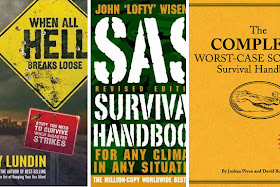
Bushcraft
Bushcraft is a long-term extension of survival skills. A popular term for wilderness skills in Australia, New Zealand and South Africa, the term was popularised in the southern hemisphere by Les Hiddins (The Bush Tucker Man) in Australia as well as in the northern hemisphere by Mors Kochanski and recently gained considerable currency in the United Kingdom due to the popularity of Ray Mears and his bushcraft and survival television programmes. Bushcraft is about surviving and thriving in the natural environment, and the acquisition of ancient skills and knowledge to do so. Bushcraft skills include; firecraft, tracking, hunting, fishing, shelter building, the use of tools such as knives and axes, foraging, hand-carving wood, container construction from natural materials, rope and twine-making, and many others. These are the kinds of skills well known to our ancient predecessors, many of which are still practiced today as an everyday skill amongst aboriginal and native peoples around the world.
Survival skills
Survival skills are techniques a person may use in a dangerous situation (e.g. natural disasters) to save themselves or others (see also bushcraft). Generally speaking, these techniques are meant to provide the basic necessities for human life: water, food, shelter, habitat, and the need to think straight, to signal for help, to navigate safely, to avoid unpleasant interactions with animals and plants and for first aid. Survival skills are often basic ideas and abilities that ancient humans had to use for thousands of years, so these skills are partially a reenactment of history. Many of these skills are the ways to enjoy extended periods of time in remote places, or a way to thrive in nature. Even hiking, backpacking, horseback riding, fishing, hunting, or some other activity, you need to make sure you have the basic wilderness survival skills to handle an emergency situation. Some people use these skills to better appreciate nature and for recreation, not just survival. I personally have learnt alot from many people but Ray Mears is the man, below is just a few of many he has to offer
P.L.A.N
Protection - Ensure you are not or will not be in harm
Location - Research and know you're location where to alert rescuers or settle
Acquisition - Look for water and supplies
Navigation - good navigation will keep you safe
Be Prepared
In situation of disasters, floods, economic breakdown or just for fun camping make sure you are and stay physically and mentally prepared for how ever long it may be
STOP
Stop
Think
Observe
Plan
Below are 20 items that would be very useful in a situation of disasters, floods, economic breakdown or just for fun camping and they are things that I have purchased myself
1) Lafesaver water bottle - £149.99

2) Mini 1st aid - £12.99

3) survival kit - Whistle, light, knife, compass, saw, matches and many others - £14.99

4) Hammock and tent - £75

5) swiss army knife - £22

6) X4 Foil blankets - X1 foil tent - £10

7) Organic seeds (lots of them)

8) cooking set - ?

9) Water proof bag - £25

10) Water proof trousers and coat - ?

11) Led headlight - £5

12) NBC gas mask - (Nuclear - Biological - Chemical) - £15

13) Maps - £5

14) Solar phone and battery charger - £25

15) Tin with lighter, flints, matches, rizler, card, gas - ?

16) Survival books - ?

17) Axe - ?

18) Small supply of cloths

19) 12 hour glow sticks - X10 = £10

20) Toiletries bag - ?

No comments:
Post a Comment